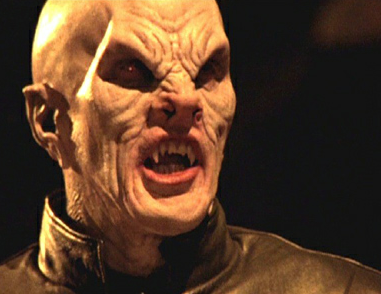Buffy: Welcome to the Hellmouth/The Harvest

Why does a person start watching a TV show? Why do they carry on watching even if the first few episodes aren’t really that impressive (as they often aren’t)? What is it in a show that can make you think there’s something interesting there?
I think the first thing is: the name. I suspect that even if I hadn’t heard anything about the show, I’d have been interested by the title because it sounds funny. It sounds like exactly the kind of thing I’d always liked: something that combines fantasy or SF with comedy. The same thing I love Douglas Adams for, and Terry Pratchett, and Tom Holt and Robert Rankin and Jasper Fforde. The thing that’s missing from the often po-faced Star Trek, and the thing that makes the best classic Doctor Who episodes so good .
It’s an important thing to learn about titles, I think, that they need to communicate the experience you’ll have while watching the show (or reading the book, or playing the game, or whatever). A show just called “Buffy” or even “The Adventures of Buffy” would make you think “Clueless”. A show called “Astarte the Vampire Slayer” would make you think “fantasy, women in leather bikinis, like Xena or Witchblade”. It’s the juxtaposition of the Valley Girl name with the fantasy trope that makes the show sound smart and unusual and funny. Titles are hard, and important.
So do these opening episodes live up to the promise of the title? Eh, in some ways.
I think Roger Ebert’s quote is applicable almost everywhere, and especially to Buffy: “a general principle involving not only Star Trek but Star Wars and all the epic serials, especially the James Bond movies: Each film is only as good as its villain. Since the heroes and the gimmicks tend to repeat from film to film, only a great villain can transform a good try into a triumph.”
This is ridiculously true here. The Master is not a great villain: he comes straight from Hammer Horror, all he wants is to do EVIL and at this point to be released from the prison where he is caught, in an overly comic image, “stuck, rather like a cork in a bottle”. When one thinks of the great Buffy seasons, they uniformly have great villains, and villiains who work with the central metaphor of the show – that high school, and then life, is hell, that we’re all fighting horrible demons all the time. Who are the best villains? The bad boyfriend. The best friend who turns on you. The powerful, suffocating forces of conservatism (the Mayor). The Queen Bee girl with her sycophantic followers (actually, Glory is a reprise of Cordelia in a way, which is nice). Compared to these villains, the Master has no allegorical power. He is what he is, a vampire stuck in a hole. So while he can threaten and posture and look scary, he can’t get any of them where it really hurts: in the heart.
But there are some things to love. Although the characters are only sketched in in these first two episodes, there’s a sense still that there’s more to them than we’re seeing. Cordelia the bitch mentions that her mom has Epstein-Barr. Giles the buttoned-up librarian gets a little bit too eager when talking about the forces of darkness. If you’re sharp-eyed you might come away from these episodes with a sense that there are non-cliched places to take these characters.
If you’ve seen the whole of the show, of course, there are some great resonances. One I hadn’t spotted before this rewatch: here in this first episode, Giles tells Buffy that she’s not like her laughing, dancing teenage friends in exactly the same spot in the Bronze where Spike will eventually tell her the same thing… and then get a bit more hands-on with his demonstration.
But even without having seen the whole thing, there’s some nice patterning in the writing. Giles and Cordelia both test Buffy by asking her for arcane knowledge to prove she’s ‘one of them’. “Vamp nail polish? So over.” “Identify a vampire. That guy.” And she passes both tests, and she fits in perfectly into both groups, and she spends these two episodes trying to reject both of them. She doesn’t want to be a vampire slayer. But she also doesn’t want to be “Buffy”, a Cordelia-follower and bitch.
She ends up with Willow and Xander because they’re some kind of alternative to those two all-consuming groups which say “if you’re with us you can’t do anything else”. And there’s the central dilemma of the show. How to reconcile those two parts of the title. And that’s the lovely thing about the title too: if conflict is the essence of drama, then a title which contains a conflict is a great place to start.




 Previous post
Previous post
